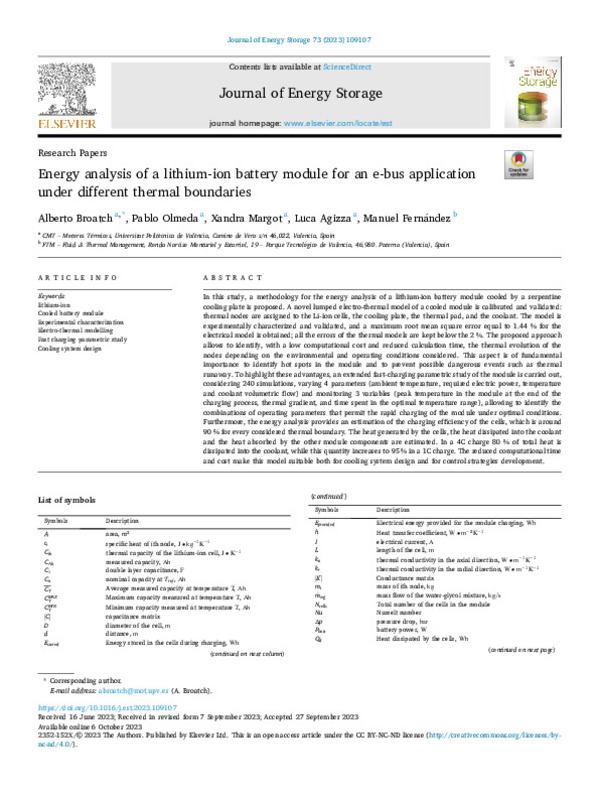JavaScript is disabled for your browser. Some features of this site may not work without it.
Buscar en RiuNet
Listar
Mi cuenta
Estadísticas
Ayuda RiuNet
Admin. UPV
Energy analysis of a lithium-ion battery module for an e-bus application under different thermal boundaries
Mostrar el registro sencillo del ítem
Ficheros en el ítem
| dc.contributor.author | Broatch, A.
|
es_ES |
| dc.contributor.author | Olmeda, P.
|
es_ES |
| dc.contributor.author | Margot , Xandra
|
es_ES |
| dc.contributor.author | Agizza, Luca
|
es_ES |
| dc.contributor.author | Fernández, Manuel
|
es_ES |
| dc.date.accessioned | 2023-12-21T19:02:12Z | |
| dc.date.available | 2023-12-21T19:02:12Z | |
| dc.date.issued | 2023-12-15 | es_ES |
| dc.identifier.issn | 2352-152X | es_ES |
| dc.identifier.uri | http://hdl.handle.net/10251/201050 | |
| dc.description.abstract | [EN] In this study, a methodology for the energy analysis of a lithium-ion battery module cooled by a serpentine cooling plate is proposed. A novel lumped electro-thermal model of a cooled module is calibrated and validated: thermal nodes are assigned to the Li-ion cells, the cooling plate, the thermal pad, and the coolant. The model is experimentally characterized and validated, and a maximum root mean square error equal to 1.44% for the electrical model is obtained; all the errors of the thermal models are kept below the 2%. The proposed approach allows to identify, with a low computational cost and reduced calculation time, the thermal evolution of the nodes depending on the environmental and operating conditions considered. This aspect is of fundamental importance to identify hot spots in the module and to prevent possible dangerous events such as thermal runaway. To highlight these advantages, an extended fast-charging parametric study of the module is carried out, considering 240 simulations, varying 4 parameters (ambient temperature, required electric power, temperature and coolant volumetric flow) and monitoring 3 variables (peak temperature in the module at the end of the charging process, thermal gradient, and time spent in the optimal temperature range), allowing to identify the combinations of operating parameters that permit the rapid charging of the module under optimal conditions. Furthermore, the energy analysis provides an estimation of the charging efficiency of the cells, which is around 90% for every considered thermal boundary. The heat generated by the cells, the heat dissipated into the coolant and the heat absorbed by the other module components are estimated: in a 4C charge, the 80% of total heat is dissipated into the coolant, while in a 1C charge, this aliquot is equal to 95%. The reduced computational time and cost make this model suitable both for cooling system design and for control strategies development. | es_ES |
| dc.description.sponsorship | This work was supported by Generalitat Valenciana within the framework of the PROMETEO project "Contribution to the decarbon-ization of transport by optimizing the thermal management of vehicle batteries electrified" with reference number PROMETEO/2020/042. Luca Agizza is supported by grant ACIF/2021/005 funded by Conselleria de Innovacion, Universidades, Ciencia y Sociedad Digital of the Generalitat Valenciana. | es_ES |
| dc.language | Inglés | es_ES |
| dc.publisher | Elsevier | es_ES |
| dc.relation.ispartof | Journal of Energy Storage | es_ES |
| dc.rights | Reconocimiento - No comercial - Sin obra derivada (by-nc-nd) | es_ES |
| dc.subject | Lithium-ion | es_ES |
| dc.subject | Cooled battery module | es_ES |
| dc.subject | Experimental characterization | es_ES |
| dc.subject | Electro-thermal modelling | es_ES |
| dc.subject | Fast charging parametric study | es_ES |
| dc.subject | Cooling system design | es_ES |
| dc.subject.classification | INGENIERIA AEROESPACIAL | es_ES |
| dc.subject.classification | MAQUINAS Y MOTORES TERMICOS | es_ES |
| dc.title | Energy analysis of a lithium-ion battery module for an e-bus application under different thermal boundaries | es_ES |
| dc.type | Artículo | es_ES |
| dc.identifier.doi | 10.1016/j.est.2023.109107 | es_ES |
| dc.relation.projectID | info:eu-repo/grantAgreement/GVA//ACIF%2F2021%2F005/ | es_ES |
| dc.relation.projectID | info:eu-repo/grantAgreement/GVA//PROMETEO%2F2020%2F042/ | es_ES |
| dc.rights.accessRights | Abierto | es_ES |
| dc.contributor.affiliation | Universitat Politècnica de València. Escuela Técnica Superior de Ingeniería del Diseño - Escola Tècnica Superior d'Enginyeria del Disseny | es_ES |
| dc.description.bibliographicCitation | Broatch, A.; Olmeda, P.; Margot, X.; Agizza, L.; Fernández, M. (2023). Energy analysis of a lithium-ion battery module for an e-bus application under different thermal boundaries. Journal of Energy Storage. 73:1-22. https://doi.org/10.1016/j.est.2023.109107 | es_ES |
| dc.description.accrualMethod | S | es_ES |
| dc.relation.publisherversion | https://doi.org/10.1016/j.est.2023.109107 | es_ES |
| dc.description.upvformatpinicio | 1 | es_ES |
| dc.description.upvformatpfin | 22 | es_ES |
| dc.type.version | info:eu-repo/semantics/publishedVersion | es_ES |
| dc.description.volume | 73 | es_ES |
| dc.relation.pasarela | S\500665 | es_ES |
| dc.contributor.funder | Generalitat Valenciana | es_ES |
| dc.contributor.funder | Universitat Politècnica de València |








